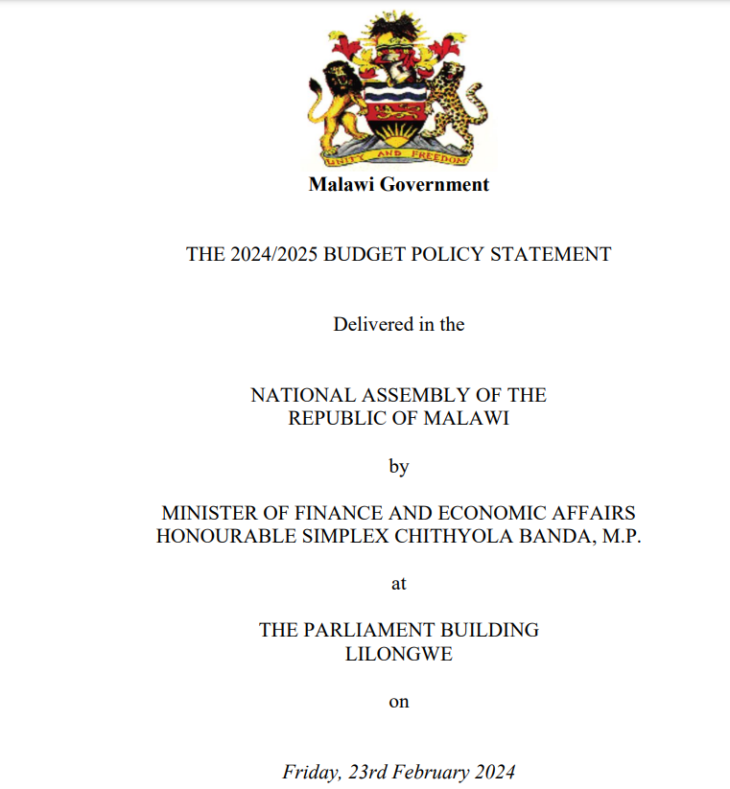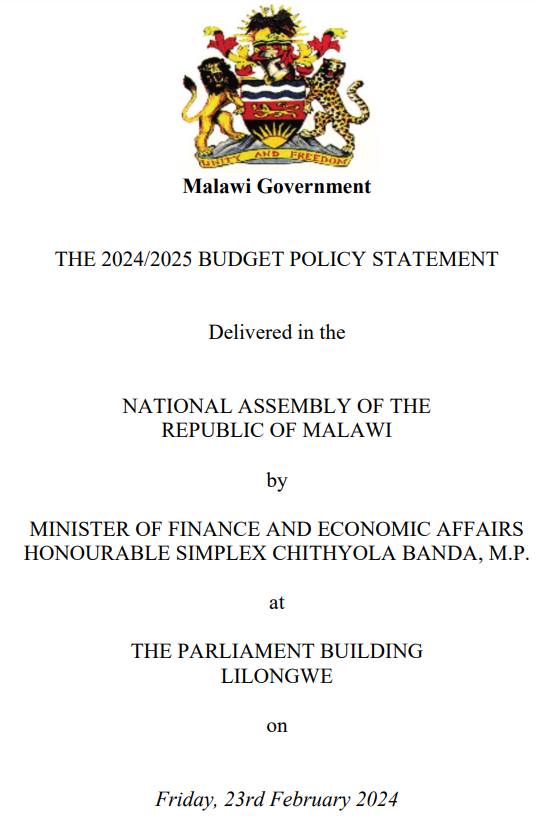
2024-2025 Budget Statement by Minister of Finance
 Hello everyone, on this page you will be able to download the 2024-2025 budget statement by Minister of Finance and Economic Affairs, Simplex Chithyola-Banda. We will also give a quick analysis of what the budget statement means for Malawians, with a focus on key areas like education, healthcare, and infrastructure. Additionally, we will provide insights into potential impacts on businesses and the overall economy.
Hello everyone, on this page you will be able to download the 2024-2025 budget statement by Minister of Finance and Economic Affairs, Simplex Chithyola-Banda. We will also give a quick analysis of what the budget statement means for Malawians, with a focus on key areas like education, healthcare, and infrastructure. Additionally, we will provide insights into potential impacts on businesses and the overall economy.
How to download 2024-2025 Budget Statement
- Get the PDF version from our servers: Download 2024/2025 Budget Statement PDF
What are some important things from the statement
We have highlighted most of the important things he mentioned:
- Addressing economic challenges through recovery, development, and protection strategies.
- Enhancing domestic revenue mobilization and rationalizing expenditures towards productive sectors.
- Implementing reforms in public expenditure, advancing export strategies, and improving foreign reserves.
- Launching initiatives to boost foreign exchange earnings, including Mega Farms, Labour Export, Carbon Credits Trading, and Cannabis Biomass Projects.
- Focusing on Agriculture, Tourism, and Mining (ATM Strategy) as anchor sectors for economic growth.
- Increasing Social Cash Transfer Benefit Levels and coverage to support vulnerable populations.
- Continuing with the implementation of the Extended Credit Facility Program to assist in the recovery process.
- Enhancing accountability and management in public finance through various reforms and digitalization efforts.
- Prioritizing human capital development, infrastructure projects, and social protection programs to foster inclusive and sustainable growth.
What was the budget statement about?
The Finance and Economic Affairs Minister of Malawi, Honourable Simplex Chithyola Banda, announced the 2024/2025 budget totaling K5.98 trillion, which constitutes 31.9% of the GDP. He conveyed optimism about the economy’s path to recovery from both economic and climatic setbacks. The budget includes a projection for wages and salaries at K1.08 trillion or 5.7% of the GDP. It features tax adjustments, raising the Pay As You Earn Tax threshold from K100,000 to K150,000 and doubling the Constituency Development Fund to K200 million. Additionally, K12.0 billion is dedicated to the National Food Reserve Agency for strategic grain reserves, with ADMARC receiving K40 billion for enhancing agricultural production and the Affordable Inputs Programme allocated K161.28 billion.
Our Analysis:
While the raising the PAYE(pay as you earn) from 100K to 150K does help a good number of employers and employees in Malawi who won’t have to pay taxes on their earnings, this budget statement should have focused more on fixing the leaks in Government, by this we mean finally putting roadblocks on why ADMARC failed and why the AIP is failing and if the CDF(constituency development fund) deserved to get funds increased to K200 million. In short, the local audit industry is needed more than ever so that we don’t have level 1 corruption which is missing funds or simply not getting the job done, this can be solved by a thick and strong local audit industry supported by strong and thick policies.
Continuing the analysis of the budget statement, it’s imperative to delve into the structural inefficiencies and financial mismanagement that have plagued key institutions like ADMARC and the Affordable Inputs Programme (AIP), alongside evaluating the increased funding towards the Constituency Development Fund (CDF). Recent audits and reports reveal a multifaceted crisis within ADMARC, characterized by profound financial losses, mismanagement, and corruption, significantly undermining its mandate to stabilize agricultural markets and support smallholder farmers.
- ADMARC’s Challenges: A series of audits unveiled a deep-seated culture of corporate fraud and mismanagement within ADMARC. Losses amounting to K330 million were attributed to ghost workers and fraudulent claims. The financial discrepancies included insurance payments for non-ADMARC staff and a significant gap between expected and actual payroll deductions, signaling a lack of internal controls and accountability. Read more.
Our Solution: To rectify these issues, there’s a pressing need for comprehensive reforms within ADMARC and a reevaluation of the AIP’s implementation to ensure these initiatives fulfill their intended purposes of supporting Malawi’s agricultural sector and improving the livelihoods of smallholder farmers. The increase in the CDF, while potentially beneficial for local development projects, must be managed with strict oversight to prevent misuse and ensure that funds directly contribute to sustainable community development.
Like we noted, this is only a quick analysis but we hope some of you journalists, writers, social media users, political science students, teachers, politicians alike, can continue to help the government by giving them feedback on what they can do to help us and thus themselves.
- The Hidden Costs of Sending Money Home: A Look into Malawi’s Remittance Rates - March 15, 2024
- Malawi Resumes Passport Printing: What You Need to Know - March 12, 2024
- Malawi’s Maize Prices Show Decline, Relief for Consumers - March 12, 2024
